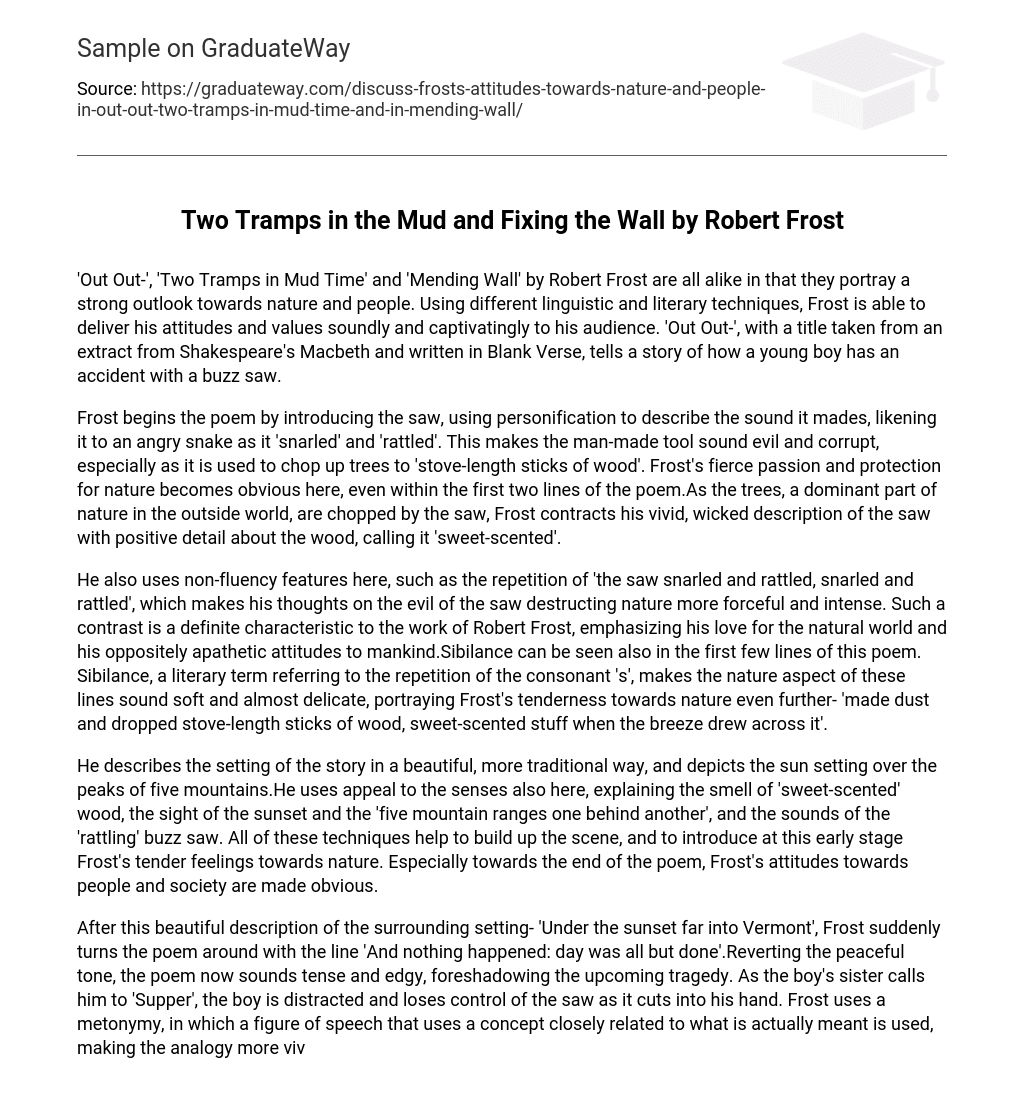The poems “Out Out-“, “Two Tramps in Mud Time”, and “Mending Wall” by Robert Frost all share a common theme of expressing a strong perspective on both nature and people. Through the use of various linguistic and literary techniques, Frost effectively conveys his attitudes and values to his readers. In “Out Out-“, which takes its title from Shakespeare’s Macbeth and is written in Blank Verse, Frost tells the story of a young boy’s unfortunate encounter with a buzz saw.
In the poem, Frost personifies the saw and compares its sound to that of an angry snake, using words like ‘snarled’ and ‘rattled’. This personification gives the impression that the tool is evil and corrupt, especially since it is used to chop up trees into smaller pieces. Frost’s deep love and desire to protect nature is evident even in the first two lines of the poem. As the saw cuts down the trees, which are a significant part of the natural world, Frost contrasts his negative description of the saw with positive details about the wood, describing it as ‘sweet-scented’.
He also incorporates non-fluency features, like the repetition of ‘the saw snarled and rattled, snarled and rattled’, to emphasize the destructive nature of the saw and intensify his thoughts on its evil. This contrasting style is a distinct characteristic of Robert Frost’s work, highlighting his fondness for the natural world and his contrasting apathetic stance towards humanity. Additionally, sibilance can be observed in the initial lines of the poem. The repetition of the consonant ‘s’, known as sibilance, adds a soft and delicate tone to the portrayal of nature in these lines, further emphasizing Frost’s tenderness towards it – ‘made dust and dropped stove-length sticks of wood, sweet-scented stuff when the breeze drew across it’.
In a poetic manner, the author vividly describes the picturesque setting of the story. He portrays the sun gracefully descending behind five majestic mountains. By appealing to the senses, he beautifully depicts the fragrance of “sweet-scented” wood, the captivating visuals of the setting sun and the successive mountain ranges, as well as the distinctive sounds emitted by a buzzing saw. Through the utilization of these techniques, he skillfully constructs the scene, while also establishing Frost’s affectionate connection with nature from an early stage. Towards the conclusion of the poem, Frost’s perspective on individuals and society becomes evident.
After providing a lovely portrayal of the picturesque setting, described as being “Under the sunset far into Vermont,” Frost takes a sudden shift in the poem with the line “And nothing happened: day was all but done.” This shift in tone alters the peaceful atmosphere into one filled with tension and unease, hinting at an impending tragedy. Just as the boy’s sister interrupts his thoughts and calls him to come inside for supper, his attention is diverted and he loses control of the saw, resulting in it cutting into his hand. Frost employs a metonymy, a figure of speech that uses a related concept to enhance the analogy, in this case “Holding up his hand.”
According to Frost, people and life seem to be contained and preserved, symbolized by the phrase ‘..as if to keep the life from spilling’.
The boy’s act of cutting open his hand not only results in the loss of blood but also symbolizes the loss of his own life, demonstrating Frost’s appreciation for the value of life. Nevertheless, Frost contradicts this sentiment in the subsequent lines, where he satirizes people and their perspectives on life compared to his own. Fearful of potential amputation, the boy begs his sister to prevent the doctor from taking his hand, highlighting Frost’s critique of society’s indifference towards death.
When the young boy accidentally cuts his hand, he responds with a ‘rueful laugh’ instead of screaming in pain, which is ironic. The poem’s tone shifts dramatically, as the mood darkens with a vivid description of the boy’s death. The doctor administers anesthesia to put the boy to sleep, but unfortunately, he does not wake up. The people no longer have any use for him, as they state ‘no more to build on there’. This reveals Frost’s belief that people exploit and lack compassion when it comes to death.
The poem concludes with the line “And they, since they were not the one dead, turned to their affairs,” which abruptly ends the poem, illustrating Frost’s belief that people are primarily concerned with their own lives, and also underscores society’s indifference towards death and tragedy. Similarly, in Mending Wall, Frost expresses a negative perspective towards people, but a more positive one towards nature. The poem narrates the annual ritual of Frost and his neighbor repairing the wall that divides their properties, and highlights the melancholy it brings to Frost.
Mending Wall is written in a conversational and reflective tone, expressing ideas and attitudes of Frost. The use of the first person perspective adds to the evident personal nature of the poem. Unlike ‘Out Out-‘, this poem does not have stanzas and relies heavily on the conjunctive word ‘and’. This stylistic choice contributes to the casual and conversational tone, showcasing the numerous ideas and thoughts Frost has on the subject. The poem opens with the line ‘Something there is that doesn’t love a wall’. The identity of this ‘something’ remains unclear, adding a hint of mystery to the poem.
Rather than accepting the logical explanation of the wall being damaged by hunters, Frost instead posits that it must be nature at work, attempting to demolish the wall. Both Frost and nature recognize the futility of the wall, unlike the neighbor. The line ‘Sends the frozen-ground-swell under it’ suggests that frost causes the damage and cracks in the wall. This demonstrates Frost’s appreciation for nature, as it realizes the pointlessness of the wall and tries to resolve the issue, further highlighting Frost’s affinity for nature. This differs from the neighbor, who despite being a human being and presumably intelligent, is unable to comprehend the wall’s absurdity, unlike Frost.





